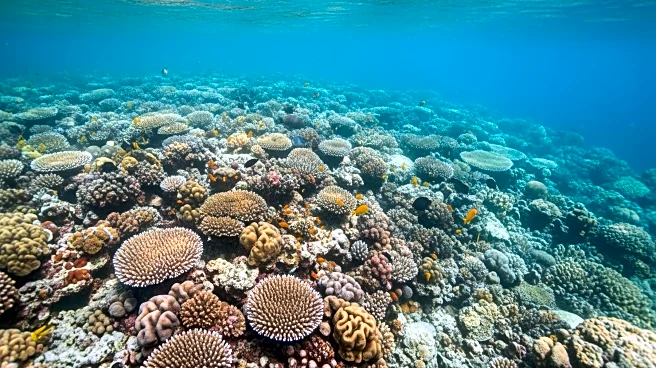What's Happening?
Kaʻiku Kaholoaʻa, a doctoral candidate at Stanford University, is conducting research on the thermal tolerance of corals in Molokaʻi, Hawaii. His study focuses on how corals respond to rising water temperatures,
a phenomenon known as coral bleaching. Kaholoaʻa and his team are testing approximately 1,000 coral samples from Maui and Molokaʻi to determine their resilience to heat. The research aims to identify corals that can withstand higher temperatures, which is crucial for understanding how coral populations might adapt to climate change. The study also explores the genetic basis of thermal tolerance, suggesting that corals with heat-resistant traits could pass these on to future generations.
Why It's Important?
This research is significant as it addresses the impact of climate change on coral reefs, which are vital to marine biodiversity and local economies. Coral reefs provide habitat for numerous marine species and are crucial for coastal protection and tourism. Understanding which corals are more resilient to heat can inform conservation strategies and help protect these ecosystems from the adverse effects of climate change. The findings could lead to the designation of marine protected areas, ensuring the preservation of heat-tolerant coral populations. This research also highlights the potential for genetic adaptation in corals, offering hope for their survival in warming oceans.
What's Next?
Kaholoaʻa plans to continue his research by conducting genetic testing on the coral samples to confirm their thermal tolerance. This process may take up to two years due to financial constraints and the complexity of the analysis. The results could support the establishment of marine protected areas in Hawaii, focusing on reefs with high thermal tolerance. Kaholoaʻa also aims to inspire Native Hawaiian youth to pursue careers in science, emphasizing the importance of local involvement in conservation efforts. His work underscores the need for community-driven initiatives to protect Hawaii's coral reefs.
Beyond the Headlines
The research conducted by Kaholoaʻa not only contributes to scientific understanding but also emphasizes the cultural significance of coral reefs to Native Hawaiians. By involving local communities in the research process, Kaholoaʻa fosters a sense of stewardship and encourages sustainable practices. This approach highlights the intersection of science and indigenous knowledge, promoting a holistic view of environmental conservation. The study also addresses broader issues of representation in science, as Kaholoaʻa serves as a role model for Native Hawaiian youth, challenging stereotypes and inspiring future generations.









